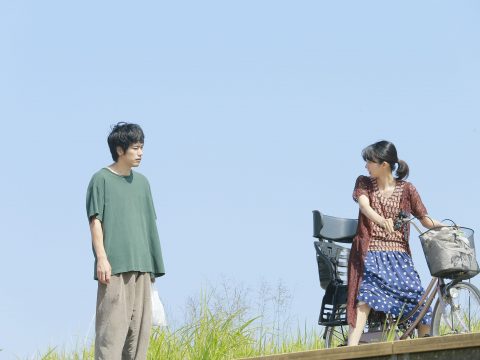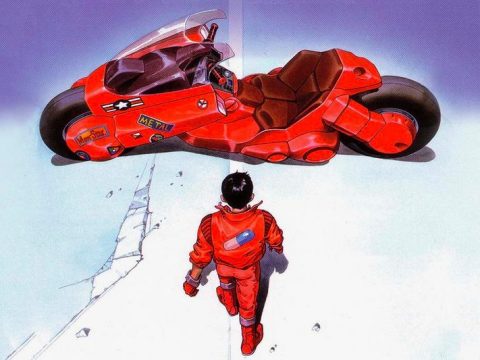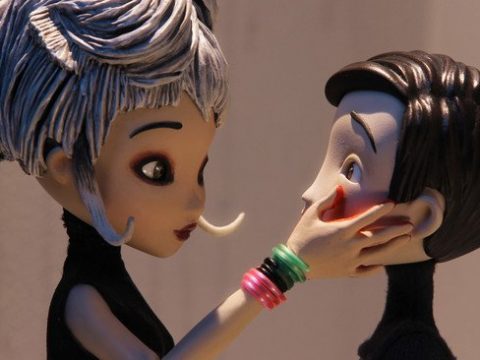[Interview excerpted from the December 2007 issue of Otaku USA Magazine.
William Tsutusi and David Cox are real smart guys.
William is an associate professor of history at the University of Kansas. David teaches multimedia at San Francisco City College. Both are rabid Godzilla fans, which just goes to show how smart they really are.
 Need some proof? William is the author of the book Godzilla on My Mind: Fifty Years of the King of Monsters, which won the 2005 William Rockhill Nelson Award for nonfiction. Meanwhile, David is an acclaimed filmmaker who’s work-in-progress, Dr. Yes, will incorporate miniature cities and kaiju battles into an experimental SF narrative about San Francisco’s Mission District. (You can see his earlier acclaimed film Otherzone on the Internet here.)
Need some proof? William is the author of the book Godzilla on My Mind: Fifty Years of the King of Monsters, which won the 2005 William Rockhill Nelson Award for nonfiction. Meanwhile, David is an acclaimed filmmaker who’s work-in-progress, Dr. Yes, will incorporate miniature cities and kaiju battles into an experimental SF narrative about San Francisco’s Mission District. (You can see his earlier acclaimed film Otherzone on the Internet here.)
On the occasion of the recent release of the new book, In Godzilla’s Footsteps: Japanese Pop Culture Icons on the Global Stage (Palgrave Macmillan), edited by Tsutsui and Michiko Ito, we somehow managed get these two hopeless fan boys together to talk about their favorite monster movies.
– Patrick Macias
David Cox: In your introduction to In Godzilla’s Footsteps you really explore the notion of the flexibility of the Godzilla character and how this ties into the idea of “postwar deformity.” Godzilla started serious, but in the 60s he became kid’s fare, and then from the 80s on he was brought back to his menacing origins. He’s nothing if not able to change according to the cultural conditions of Japan at the time.
William Tsutusi: He’s sort of the Madonna of the Japanese screen. Obviously, this is easier in Godzilla’s case than it would be for a real actor because he is a fictional character-a man in the rubber suit. He’s not affected by an off- screen personality. There’s no Godzilla appearing on TV shows and doing interviews. I think he’s more flexible on the screen because of that.
DC: I think the nearest equivalent would be the Daleks from Dr. Who. I always interpret the Daleks as emblematic of postwar anxiety about Nazism. Like Godzilla in Japan, the Daleks perform a similar role in British culture as “the other.” The second article in the In the Footsteps of Godzilla book, “Mobilzing Gojira” (by Mark Anderson), theorizes that Godzilla represents a way for Japan to play through the complicated notion of modernity in an imperial global village where Godzilla symbolizes a kind of amputees’ itch for empire.
 WT: Mark’s essay is very difficult but I think he makes a lot of good points. The most important ones for me include this idea of empire and the continuity of imperial thinking in the postwar world. This essay does what I hope the whole book does: it shows Godzilla’s broad significance beyond the realm of popular culture and into other realms including politics. One of the major themes of the Godzilla films is commemorating World War II and they sometimes show how the Japanese deal with the memory of it in a way that doesn’t discredit real patriots who wound up fighting and dying on the losing side.
WT: Mark’s essay is very difficult but I think he makes a lot of good points. The most important ones for me include this idea of empire and the continuity of imperial thinking in the postwar world. This essay does what I hope the whole book does: it shows Godzilla’s broad significance beyond the realm of popular culture and into other realms including politics. One of the major themes of the Godzilla films is commemorating World War II and they sometimes show how the Japanese deal with the memory of it in a way that doesn’t discredit real patriots who wound up fighting and dying on the losing side.
DC: It’s similar to the way Russians deal with their trauma in war films like Come and See (1985). Even Spielberg’s War of the Worlds (2005) is a kind of post-9/11 allegory where the aliens stand in for a sudden and outrageous attack that comes from nowhere. Ryuhei Kitamura’s Godzilla: Final Wars (2004) struck me as nothing if not a critique of the post-9/11 world we live in. Anyway, there’s another great essay in the book, “Gojira as Japan’s First Postwar Media Event” by Barak Kushner, that addresses the Godzilla film as a kind of social catharsis.
WT: If we are talking about the original 1954 Gojira, then definitely that sense of catharsis is there in those scenes of the city burning and afterward with the scenes in the hospital. Clearly the Japanese are dealing with some of their greatest fears from Hiroshima, Nagasaki, and the Tokyo fire bombings. And yet the catharsis also works in interesting ways; the way Gojira ends with the Japanese victorious over the monster and celebrating is in some ways a therapeutic rewriting of the end of World War II..
DC: There’s very often a scene in the later Godzilla films where the head military guy or scientist faces off with the monster, and they just stare at each other… and then Godzilla usually blasts them off the face of the earth! (laughs).
WT: I’m trying to think back over the series and how that relationship between humans and Godzilla plays out over time. The great success of the original 1954 movie is the extent to which you are repelled by Godzilla and terrified by his power. And yet you are also drawn to him as well. I almost always have a tear in my eye at the end because I feel such sympathy for the monster dying. One way or another, Godzilla has become a more sophisticated character that appeals to the audience on a lot of different levels.
DC: Whenever I bring up Godzilla, especially in America, the movies are usually dismissed outright as goofy, wacky, cheese from Japan. Why do you think that anything that looks remotely simulated is immediately dismissed in the US as “cheesy”?
 WT: Many of these films have actually been “cheesed-up” for American audiences. It seems that the US distributors deemed the Japanese originals not cheesy enough so they had to be made even more laughable with bad editing, dubbing, and adding “jokes” and so forth. So if there are any villains here, I think it’s the distributors who felt that these films could not stand on their own. That being said, part of the appeal for American audiences has been the “cheesiness” that makes it easy to laugh at these films.
WT: Many of these films have actually been “cheesed-up” for American audiences. It seems that the US distributors deemed the Japanese originals not cheesy enough so they had to be made even more laughable with bad editing, dubbing, and adding “jokes” and so forth. So if there are any villains here, I think it’s the distributors who felt that these films could not stand on their own. That being said, part of the appeal for American audiences has been the “cheesiness” that makes it easy to laugh at these films.
DC: So what is the state right now of Godzilla studies within academia?
WT: It’s only been in the last 10 years or so that Japanese pop culture has had any kind of credibility within the academy. Now, as they’ve proven to have a greater global impact, that’s beginning to turn around and a lot of people are working on this field very seriously. But I think Godzilla is still going to take a while to get the kind of academic respect I think he deserves. People still look at Godzilla with kind of a wink and a smile, because that heritage of “cheese” is so strong. Nevertheless, the more research that gets published by a wide variety of scholars from different disciplinary background -like the kind we find in In Godzilla’s Footsteps-the greater profile Godzilla is going to have in the academy.







